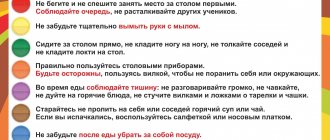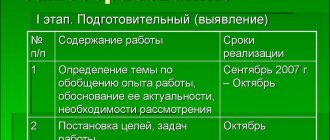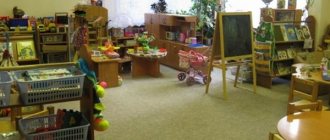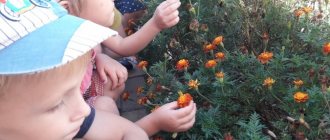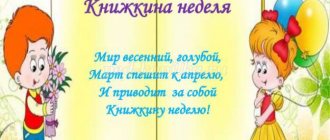Self-education plan for a middle group teacher in kindergarten
Specific topics that are relevant specifically for teachers of the secondary group relate to the following issues:
- creative development of children 4–5 years old through the use of non-traditional techniques of visual activity;
- development of dialogical speech and communication skills;
- spiritual and moral education;
- fine motor skills training;
- use of gaming activities in mathematics classes;
- formation of ideas about the culture of health.
The main selection criterion should be the difficulties that the teacher has in working with children. In order to fully master the indicated scientific and methodological problem, it is necessary to have a correctly drawn up plan for self-education.
Planning is preceded by a justification for the relevance of the chosen topic, a list of goals and objectives, expected results and intended prospects. Let's consider the typical structure of a self-education plan for a kindergarten teacher in the middle group, indicating the main forms of work.
| No. | The content of the work | Implementation period |
| Studying methodological literature. Work with documents. | September, throughout the year | |
| Familiarization with teaching experience. | September, throughout the year | |
| Carrying out introductory and final diagnostics. | September, May | |
| Selection of innovative, communication and speech techniques. | September – October, throughout the year | |
| Work with children | ||
| Conducting didactic, role-playing and outdoor games. | per month | |
| Organization of performances. | ||
| Watching cartoons. | ||
| Learning songs and poems. | ||
| Reading a story and talking about its content. | ||
| Guessing riddles. | ||
| Creation of an exhibition of drawings (photo). | ||
| Collaborative work. | ||
| Construction. | ||
| Excursion. | ||
| Working with parents | ||
| Creation of a mobile folder, information stand. | per month | |
| Selection of material for consultation for parents. | ||
| Creating a memo. | ||
| Providing recommendations and individual consultations. | ||
| Conducting a parent meeting. | ||
| Organization of joint activities with children, creative competitions. | ||
| Conducting an open lesson. | ||
| Organizing children's performances for parents. | ||
| Involving parents in creating a subject-development environment. | ||
| Self-realization | ||
| Development of lesson plans. | during a year | |
| Conducting open classes. | ||
| Preparation of a master class for teachers. | ||
| Preparation of the report. | ||
| Preparation of consultations for teachers at the teachers' council. | ||
| Presentation on the topic of self-education. | May | |
| Sharing experience. | ||
The structure of the plan can be expanded by adding the following columns:
- Objective;
- report form;
- practical way out;
- bibliography.
In May-June, it is necessary to analyze the implementation of the self-education plan, indicating the degree to which the intended goals have been achieved, identified difficulties in its implementation and future plans.
Thank you for your mark. If you want your name to be known to the author, log in to the site as a user and click Thank you again. Your name will appear on this page.
Login | Registration
Comment
Share Place on your website
Did you like the material? Want to read later? Save to your wall and share with friends
You can post an announcement of an article on your website with a link to its full text.
Copy article title
Copy article announcement
Copy link
Error in the text?
Error in the text? We are very sorry that we allowed her to do this. Please select it and press CTRL + ENTER on your keyboard.
By the way, this option is available on all pages of our website.
Self-education notebook
Municipal budgetary preschool educational institution
"Kindergarten No. 17 "Fairy Tale"
Self-education notebook
Gudkova Tatyana Sergeevna,
senior teacher, highest quarter category
Self-education topic:
“Improving effective forms of work for methodological support of teachers in order to increase the level of professional competence, improve the quality of implementation of the educational process within the framework of the Federal State Educational Standard for Educational Education”
Stone-on-Obi, 2017-2021
Never stop your self-education
work and don’t forget that no matter how much you study,
no matter how much they know, there is no knowledge and education
no boundaries, no limits.
ON THE. Rubakin
Introduction.
The relevance of the problem is caused by the awareness of the need to search, develop and master such forms of methodological activity that would be focused on developing the professional competence of teachers through optimizing and improving the professional orientation of the teacher in accordance with the requirements imposed at the current level of development of the education system. Meanwhile, it should be taken into account that educational institutions currently employ practical teachers with more than twenty years of experience. Hence, a contradiction arises between the educational expectations of society, the prospects for the development of the educational system and the actual implementation of these expectations in the teaching environment. The resolution of this contradiction can be facilitated by methodological work, which is one of the systemic aspects in the continuous system of education of teaching staff.
Relevance of the topic.
Increasing the level of skill of teachers is a priority area of methodological work, which occupies a special place in the management system of a preschool institution and represents an important link in the holistic system of advanced training of teaching staff, since, first of all, it contributes to the activation of the teacher’s personality and the development of his creative personality.
A constant connection between the content of methodological work and the results of teachers’ work ensures a continuous process of improving the professional skills of each educator. Traditional forms of methodological work, in which the main place was given to reports and speeches, have lost their importance due to their low efficiency and insufficient feedback. Today it is necessary to use new, active forms of work, which are characterized by the involvement of teachers in activities and dialogue, involving a free exchange of opinions.
Improving the skills of teachers, replenishing their theoretical and practical knowledge is carried out through various forms of methodological work, namely using interactive forms and methods. The value of this approach is that it provides feedback, a frank exchange of opinions, and forms positive relationships between employees.
MAGAZINE Preschooler.RF
Work plan for self-education in the middle group Topic: “Education of patriotic feelings in preschoolers through play activities”GBDOU No. 1, teacher: Shigaeva Natalia Anatolyevna
Love for your native land, native culture, native speech begins small - love for your family, for your home, for your kindergarten.
Gradually expanding, this love goes to the native country, to its history, past and present, to all humanity.
(D.S. Likhachev)
NGO "Cognitive Development"
Goal: Education of a citizen and patriot of one’s country, formation of moral values; creation of a subject-development environment conducive to this education; increasing the level of self-education.
Tasks:
- Study educational, reference and scientific-methodological literature on this topic.
- Cultivate love for home, family, kindergarten.
- Formation of moral values and a sense of belonging to the city, home, family, kindergarten.
- Invite children to participate in discussions of family holidays and some of the “problems” of the kindergarten.
- To promote the active involvement of parents in joint activities with the child in family and kindergarten settings.
- To provide children with information about the life of city residents - about the peculiarities of their work, life, culture, traditions;
- Introduce children to new games on this topic;
- Strengthening the skills of comparing, analyzing, and drawing conclusions.
- Develop visual and effective thinking, curiosity, independence, and the ability to work in a team.
Stages
| The content of the work | Deadlines | |
| 1.Organizational and orientation (diagnostic) | - formulation of the problem -selection and study of literature on the problem. — determining the goals and objectives of working on the topic - planning work on self-education | September October. |
| 2.Basic (practical) | -theoretical study of the problem (familiarity with the subject, selective study, analysis and self-assessment of results) - practical activities: application of knowledge, skills in practice: production of manuals and attributes, organization and conduct of practical work with children, parents, teachers, participation in events dedicated to the topic of self-education, | Throughout the school year. |
| 3.Final (summarizing) | - summarizing — registration of the results of work on the topic of self-education, - compiling a card index of games for patriotic education; - use of experience by the teacher himself in the process of further work. | May |
II. Step by step - a creative long-term plan on the topic of self-education
| Month | Children | Teachers | Parents | Equipment |
| 1 | 2 | 3 | 4 | 5 |
| September | The street on which our kindergarten "Teremok" is located Goal: to continue to develop children’s interest in kindergarten, the street, and residential buildings; | Excursion around the kindergarten along Parkovaya Street | Walking with children along Parkovaya Street | Map of the city of Pushkin Map of our microdistrict, map of the preschool educational institution D/i "Our kindergarten" Goal: to consolidate children’s knowledge about the kindergarten, about the location, about the kindergarten employees. What duties do they perform? Where is the band, music room, etc. located? |
| October | The street where I live. | — Conversation on the topic “The street where I live.” -Looking at illustrations: the city of Pushkin — Presentation: “Our city Pushkin, city streets” | Exhibition of drawings “Streets of our city”. Joint Project “My Favorite City” | -D/i “My street” (collect from memory) -Illustrations with views of the city. D/i “Make a map” Tasks: Strengthen children's knowledge about the city; streets, develop visual memory; instill pride in our Motherland. |
| November | The city's attractions Goal: to arouse children’s interest in the history of the emergence of historical monuments of the city, to cultivate a sense of pride in the city. A conversation about the monuments of our hometown to people who glorified our city and country. | Presentation: “Famous monuments of the city of Pushkin” Goal: To introduce children to the most famous monuments of architecture and sculpture. | Tour of the city center with parents. Master class “Games for instilling patriotic feelings in preschoolers” | D/i "Trip around the city" Purpose: to introduce you to your hometown Material: album of photographs of hometown D/i “Who knows, will guess!” Target: · Consolidate children’s knowledge about the sights of their hometown; · Develop memory, speech; · Cultivate observation and curiosity. |
| December | “What is a museum?” -conversation Symbols of the city Purpose: to introduce symbolism | — Getting to know the city’s coat of arms - introduction to symbolism | Visiting of museum. (by parents' choice) | Illustrations of the coat of arms, symbols of the city. D/i "Coat of arms of the city" Goal: to consolidate children’s understanding of the coat of arms of their hometown; be able to distinguish the coat of arms of your hometown from other signs. Materials: sample template with the image of the city coat of arms; outline template of the same coat of arms; "mosaic" of the city's coat of arms in an disassembled version. D/i “Find out the coat of arms of our country” Target: · To consolidate children's knowledge about the state emblem; · Teach to recognize the coat of arms of other countries; · Develop attention and memory; · Cultivate a desire to learn something new. |
| January | Battle glory of the city Target: cultivate a feeling of gratitude to veterans of the Great Patriotic War, love for their hometown. | Conversation about the city's participation in the Second World War. | Museum of the Siege of Leningrad - visit. | Album “The City of Pushkin in the Second World War” D/i "Military professions" Purpose of the game: to introduce children to military professions; learn to select pictures appropriate for the military profession; develop visual memory, observation and attention; activate the child’s speech, enrich the children’s vocabulary; instill pride in our Fatherland. D/i “Guess the military profession” Tasks: consolidate children's knowledge about military professions (tanker, military pilot, artilleryman, border guard, etc.); develop observation and memory; cultivate love for the Motherland. |
| February | The first architects of our city. Danini, Rastrelli. | — Conversation “Famous people of St. Petersburg. Goal: to arouse children’s interest in the architectural monuments of the city. | Excursion with parents to memorable places (optional) | Illustrations with creations Danini, Rastrelli. D/i “What’s mixed up?” The teacher deliberately places photographs of buildings on the playing field incorrectly. Children are encouraged to correct mistakes by commenting on their actions. |
| March | Transport of our city | — A conversation about the famous Leningrad metro. | Excursion with parents to metro stations. | Album with views of metro stations. D/i “On land, in the sky, on water, under water (transport)” Purpose: classification of modes of transport. Material: table showing the sky, sea, pictures: train, plane, steamship, truck, car, bus. |
| April | Getting to know the Summer Garden. | Conversations, memorizing poems about the Summer Garden. | Walk through the Summer Garden. | Card index of poems and riddles about the Summer Garden. D/i “There are guests in our city” Target: · Consolidate knowledge about your hometown in a playful way; · Develop speech and memory; · Cultivate love for your hometown. |
| May | Quiz “Hometown Connoisseurs Competition” | Project presentation. | Photo exhibition “My favorite place in the city” D/i “Walk around the city” Objectives: to consolidate students’ ideas about the streets of the nearest microdistrict and the buildings located on them; expand understanding of buildings and their purpose; establish rules for safe behavior on the street; expand spatial representations (left, right, in front, behind, between, next to, opposite, in the middle, etc.); develop coherent monologue speech; cultivate love and respect for your hometown. D/i "ENCHANCED CITY" Objectives: to consolidate children’s ideas about the architecture of modern buildings and structures; introduce the architectural features of the city |
| < Previous | Next > |
